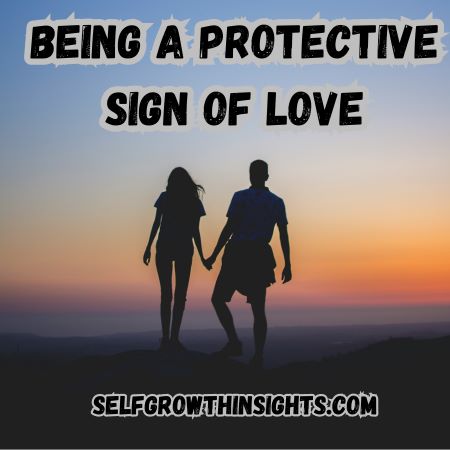The notion of protecting one’s loved ones can lead to many possible interpretations. Some view it as an organic manifestation of love or caring while others see it as a prelude to a more controlled behaviour. The distinction between these two perspectives is complex deep rooted within personal circumstances and the contexts of culture. This article delved into the complexity of protective behavior to determine if protecting is really the sign of love and how to recognize the healthy and unhealthy aspects.
The Connection Between Protectiveness and Love
At the core of all romantic relationships is the need to shield each other from danger. This urge to protect is usually connected to our evolutionary heritage and the notion that protecting one’s spouse or children is essential to survival. In modern relationships, the need for protection can manifest in the form of physical and emotional guardianship offering security and peace.
Definitions and Perceptions of Protectiveness
The term “protection” in its essence is the desire to protect people from harm or danger. But, this instinct to protect may be interpreted differently depending on personal experiences and social rules. In some cases, this could involve ensuring that a partner’s safety with boundaries, and staying cautious. Other times, it may include emotional support as well as safeguarding the well-being of a spouse.
The Psychology of Protectiveness
From an evolutionary perspective the concept of protection has its origins in survival instincts. In early times the ability to defend the offspring of one’s partner from dangers was essential to assure the longevity generations of genes. This instinct is present in relationships of today, but in more complex models. Psychological theories suggest that protection can result from the attachment patterns that were developed in the early years of childhood. Secure attachments tend to exhibit healthy levels of protection but insecure attachments may result in overprotective or controlling behaviours.

Healthy vs. Unhealthy Protectiveness
Knowing the difference between healthy and unhealthy protection is essential to maintain an equilibrium relationship. Healthy protection involves setting boundaries, encouraging trust, and assisting the freedom of others without limiting it. On the other hand excessive protectiveness could manifest as controllable behaviors, excessive jealousy and a lack confidence. Knowing these signs early will stop the decline of the quality of relationships.
Cultural Perspectives
The cultural norms play a major impact on the perception of the importance of protection. In certain societies the protective behavior is highly valued and viewed as an indication of strong familial bonds. However, in other cultures, these behaviors can be disruptive or signify the lack of trust. Knowing these cultural differences can benefit couples navigate their protection instincts with respect for the other’s values and backgrounds.
Gender Differences in Protectiveness
Protectiveness is a characteristic that can vary in different genders due largely to social influences and traditional gender roles. Men are often conditioned to protect others, showing both physical and mental guardianship. Women, however, as protecting, may express this desire through affection as well as emotional support. These different ways of being can affect relationships and their expectations.
Protectiveness in Different Types of Relationships
It isn’t just limited just to romance. It also plays a major role in parental-child relationship. In the context of friendships, protecting someone could include looking out for an individual’s wellbeing and providing suggestions. It’s often thought of as a natural aspect of caring for children in parent-child relationships. However, it is vital to balance the two to encourage independence in children.
Benefits of Being Protective in a Relationship
In business relations Being protective can have various benefits, both practical and strategic that can positively impact agreements and business contacts. This is how being cautious can benefit you:
- Protecting your interests Protection in a commercial context means protecting your interests as well as your interests as well those of another person that is a part of the relationship. This includes safeguarding intellectual property and confidential information, and making sure that both parties adhere to the terms of agreement. This level of protection creates trust and provides the foundation for a secure partnership.
- risk mitigation The concept of protection helps detect the potential risk in a business relationship at an early stage. By being vigilant and seeking to safeguard each party’s interests, companies can take steps to reduce the risk. This might include setting specific contract conditions, conducting extensive due diligence and ensuring strict quality control.
- Long-term sustainability A stance of protection in business relationships can lead to more durable relationships. If both parties know that they are both vigilant in safeguarding the rights of both parties, this facilitates an enduring and committed relationship. This helps ensure that both parties strive for mutual benefit, decreasing the chance of conflicts and encouraging a positive environment.
- Improving Reputation companies that secure their business relationships benefit from more credibility. This can help when it comes to attracting new business partnerships as well as customers who appreciate security and trust in their business dealings.
- Legal safeguards Also, protecting yourself means ensuring every legal premise is protected. This involves the compliance with international and local laws, which helps protect the business legally and protects its reputation in the marketplace against legal issues.
When Protection Becomes Overbearing
Although protection of business relations is essential for protecting interests and ensuring compliance, it is sometimes be excessive. The over-protectiveness of business relationships can impact the flow and results of business relationships. Here are a few ways where protection may be overbearing, and the potential consequences:
- reduced flexibility Protectionism in the context of business gets too much, it may result in rigidity. Contracts that are too restrictive as well as rigid terms and a reluctance to adjust to changes in the market can hinder creativity and ingenuity. This rigid approach could prevent businesses from taking advantage of new opportunities and adjusting to market trends.
- The loss of trust Trust is the most important factor for any business relationship to be successful. But, if one party is overly cautious, it may indicate an absence of trust for the other. This could result in the breakdown of communication and cooperation, which makes it challenging to accomplish mutual goals and resolve disputes in a peaceful manner.
- Affects Collaboration Collaboration thrives in a setting that both parties feel respected and valued and respected. A stoic approach to protecting could hinder dialogue and free exchange of ideas that is crucial to the success of collaboration. If people feel secluded they are not as likely to contribute their valuable ideas or suggest innovative solutions.
- Conflicts and tension The over-protection of others can cause tension and conflicts in business relationships. When one side feels they are being held back in their rights this can result in anger and even opposition. The resulting conflict can sabotage discussions and result in suboptimal agreements, or even complete break-ups.
- Opportunities Costs Being too protective can result in substantial cost of opportunity. When you are too focused on managing every aspect of business relationships it is possible for a business to take advantage of opportunities for growth and partnerships which arise from a more flexible and open approach.
You May Find Helpful
- Is No Response The Best Response? Ultimate Guide
- The Power Of Walking Away From Toxic Relationships
- How To Stop Obsessing Over A Lost Friendship – 7 Steps
Communicating Protective Feelings
Open Dialogue
Having open dialogue means talking honestly and openly about your feelings of protectiveness. It is essential to share why you feel protective without imposing your will or control on the other person. This helps both parties understand each other’s perspectives and needs, ensuring that protective behavior is seen as caring rather than controlling.
Active Listening
Active listening involves genuinely hearing and understanding the other person’s concerns and desires. It means giving your full attention, acknowledging their feelings, and responding thoughtfully. By practicing active listening, you can better balance offering protection and respecting their autonomy, ensuring that your protective actions are appreciated and not perceived as overbearing.
Benefits of Being Protective in a Relationship
Emotional Security
When someone is protective in a relationship, it provides emotional security. Knowing someone cares deeply about your safety and well-being can reduce anxiety and stress. This sense of security helps individuals feel valued and supported, contributing to their overall mental health and happiness.
Strengthened Bonds
When done with love and respect, protective behavior can strengthen individual bonds. Acts of protection, like being there during tough times or offering support and advice, build trust and deepen the connection. This makes the relationship more resilient and enduring, as both parties feel more connected and committed to each other.
Conclusion
Being protective in a relationship can be a sign of love, but it’s important to maintain a balance to avoid crossing into possessiveness or overprotectiveness. Understanding the nuances of protective behavior and maintaining open communication can foster healthy and supportive relationships. By balancing protection with respect for autonomy, relationships can thrive, providing security and freedom.
